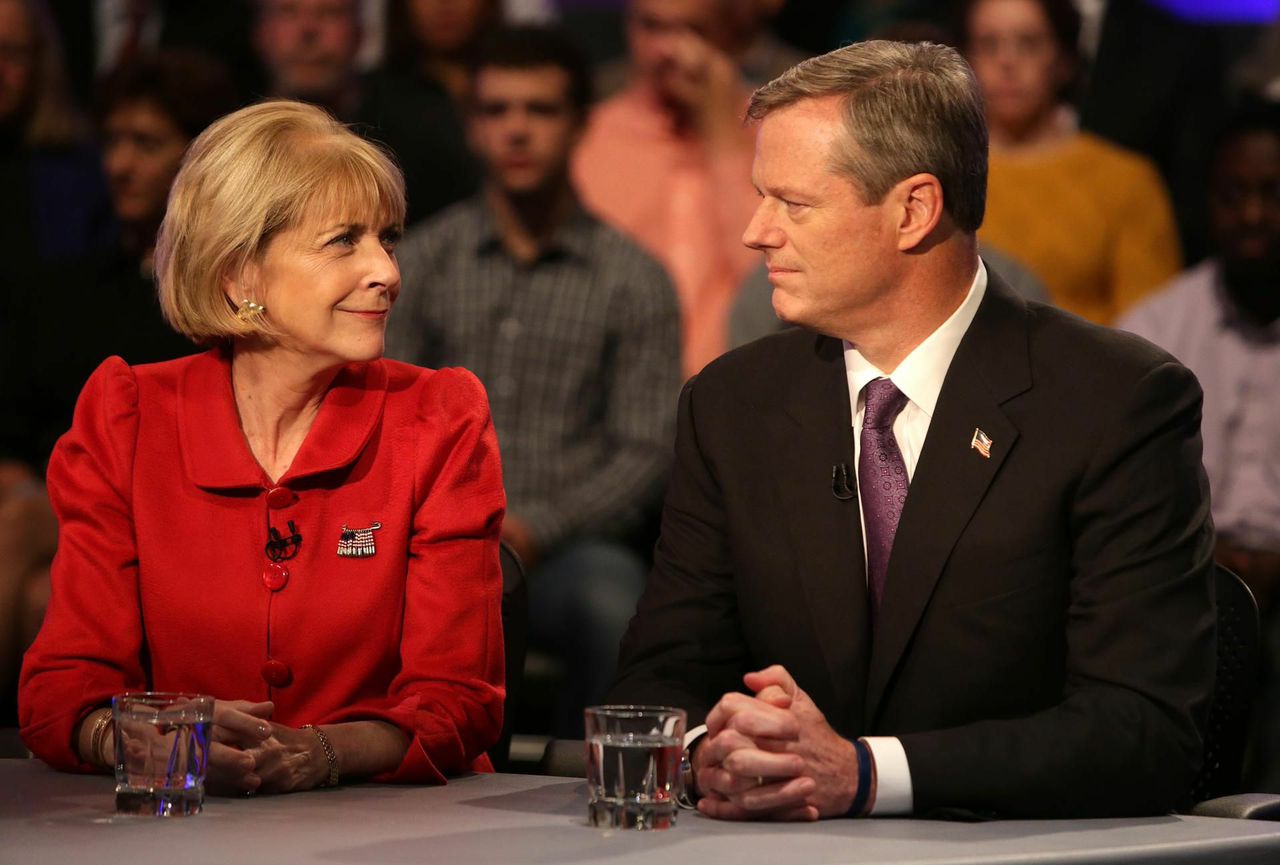BRIGHTON, Mass.—“Clint Eastwood and Meryl Streep.” That was former Harvard Pilgrim CEO and current Republican gubernatorial candidate Charlie Baker’s answer to the televised debate’s last question, “Who would play you and Martha Coakley in the film version of this campaign?”
Baker’s response elicited a chuckle from the roughly 100 audience members at the WGBH Studios in Brighton, ending the night on a lighthearted note. The preceding 59 minutes, however, were anything but lighthearted, as the two candidates spoke in generalities about their plans and traded the occasional barb.
The debate’s moderators — long-time Boston media personalities Jim Braude and Margery Egan — took Baker and Democratic candidate Martha Coakley, the State’s attorney general, through a myriad of issues, including. Several — including taxes, immigration, schooling options, jobs created by the proposed casinos and income inequality — were pertinent to Boston’s low-income residents.
Baker pledged not to raise taxes when the subject came up, citing the strain taxes put on the middle class. Braude took him to task for “already taking raising taxes off the table.” Coakley left open the option of raising taxes and said she would raise taxes only on the top two percent of income earners.
On the minimum wage, both candidates reaffirmed their support the State’s newly passed $11 per hour minimum.
When it came to immigration, Baker stood firm on not supporting driver’s licenses for undocumented workers. Coakley argued that “[We] need people to get to work.” Both candidates expressed their support for Governor Patrick’s executive order to subsidize education for those who can work in Massachusetts after graduating. Coakley extended her support to students who come to the United States with immigrant parents.
On the topic of creating new jobs, both expressed support for the proposed Springfield casino, which is expected to add 3,000 permanent jobs. Coakley and Baker supported the idea of a slots parlor and one casino, not three. Baker added that ideally Connecticut would give Massachusetts $400 million a year to not build a casino.
If the debate had a single overriding theme, it was Baker and Coakley repeatedly professing their passion for the State’s citizens.
For her part, Coakley expressed a desire to distance herself from the “icy” image she had during her losing 2010 Senate campaign.
Baker was proud of his “affinity for numbers” that would be helpful in managing a state budget, but he reiterated many times that his favorite part of the campaign was meeting voters. He spoke of his compassion for the State’s low-income population early and often throughout the night. Baker discussed “knocking on doors” in Dorchester and Mattapan during a ride along with city officials, meeting parents and discussing their children’s futures.
“We’ve got to embed ourselves in these communities as human beings,” stated Baker, without elaborating on what that future would entail.
“I’m glad you got the ride along, Charlie,” Coakley responded dismissively. She then touted her own time spent in those communities, but did not offer specifics for offering its residents opportunities.
In the debate’s final minutes, the conversation moved towards transparency. Both candidates have had well-publicized public controversies regarding finances. Coakley referenced the New Jersey Department of Treasury’s investigation into Baker’s $10,000 donation to the New Jersey State Republican Committee.
“There’s only one person at this table who has actually paid campaign finance violations,” Baker responded, curtly, “and that was Martha.”
The comment drew an audible gasp from the 30 assembled members of the press corps.
Following the debate’s conclusion, Baker mingled around the studio, taking questions from a throng of reporters. Across the room, former Massachusetts governor Bill Weld talked to a reporter. Outside the entrance to the WGBH studios, however, the debate continued for the supporters of another debate.
United Independent Party candidate Evan Falchuk was not invited to participate in the debate. In front of the studio, about a dozen Falchuk supporters gathered to voice their endorsements. They held signs and passed out informational flyers to those exiting the studio. Falchuk, who formed the United Independent Party last year, has proposed several progressive ideas, including affordable housing and a tax plan that includes a progressive income tax, which would require an amendment to the State Constitution.
Falchuk needs three percent of the vote for the United Independent Party to be recognized as an official political party in Massachusetts. The recognition allows for greater amount of citizen and in-kind donations. The most recent WBUR poll had Folchuk polling at three percent exactly.
The day after the debate, Falchuk appeared on WGBH’s political podcast The Scrum to deride the media’s lack of coverage for independent candidates. That same day, Falchuk filed a lawsuit in Suffolk Superior Court against New England Cable News (NECN), the organizers of the third and final debate on Oct. 27, for allegedly revoking an invitation to participate in that debate.
Scott Lively and Jeff McCormick, the two other independent candidates, were also not invited to participate.
As far as this debate, it was tough to declare a clear winner. Both candidates expressed concern and compassion for the State’s low-income population, but with few specifics for improvements. Baker, though, has seen significant movement in the polls.
On Oct. 15, a week prior to the debate, a WBUR/Mass Inc. Polling Group poll had Coakley leading Baker 42-39. As of Oct. 22, the day after the debate, the same poll had Baker pulling ahead of Coakley 43-42. Two days following the debate, a Boston Globe poll had Baker opening up a nine-point lead.
The election is Tuesday, Nov. 4 — eight days after the third and final debate.

Leave a Reply
You must be logged in to post a comment.